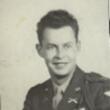The liberator: one World War II soldier's 500-day odyssey from the beaches of Sicily to the gates of Dachau
Description
More Details
9780449012666
9780307888013
Table of Contents
From the Book - First edition.
Subjects
Excerpt
Similar Titles From NoveList
Similar Authors From NoveList
Published Reviews
Booklist Review
Kershaw writes for the New York Times and has also written several books on the experiences of American soldiers during WWII. Here he chronicles the saga of the 157th Infantry from July 1943 to the end of the war. At the center of the narrative is Felix Sparks, who, born in Texas and raised in Arizona, enlisted in the army in 1936 and rose to the rank of colonel by the end of the war. He was in the thick of action as he and his regiment fought in Sicily, moved up the Italian coast and into Germany, and liberated the concentration camp at Dachau in Bavaria. Using interviews with Sparks as well as his letters and those of his men, Kershaw tells a grim but also inspiring story. There is little glory here. Rather, it is a tale of death and destruction climaxed by the horror of countless rotting corpses at Dachau, where enraged G.I.'s slaughtered German camp guards until stopped by Sparks. Still, the ability of Sparks and his men to endure and persevere endows them with a degree of nobility. This is a gripping and superbly told account of men in war.--Freeman, Jay Copyright 2010 Booklist
Publisher's Weekly Review
In his latest WWII narrative, Kershaw (The Longest Winter) examines the war through the experiences of Felix Sparks, an American law student-turned-soldier who saw action in some of the bloodiest campaigns of 1943-1945. Sparks was initially assigned as a second lieutenant with the 157th Infantry Regiment of the 45th Infantry Division (the so-called "Thunderbirds") and ended his service as a "world-weary" lieutenant colonel. Kershaw follows Sparks and the 157th as they land at Sicily, help liberate Rome, push on through France, and are among the first American troops to enter Germany. "No force in history is thought to have freed so many people and marched so far to do so," Kershaw proclaims. But the darkest moment comes when the soldiers liberate the concentration camp at Dachau, which pushes many of them to the breaking point. While Kershaw's prose can be purplish, he is a captivating narrator, hammering home the chaos and carnage of war, sparing no sensory detail to paint a cohesive picture. Kershaw's portrayal of his subject (based on interviews with Sparks, who died in 2007, and other survivors) makes for a riveting, almost epic tale of a larger-than-life, underappreciated figure. 16 pages of b&w photos, and photos throughout, 13 maps. Agent: Jim Hornfischer, Hornfischer Literary Management. (Oct. 30) (c) Copyright PWxyz, LLC. All rights reserved.
Library Journal Review
Like many of his generation, Felix Sparks did not seek glory on the battlefield but dutifully accepted the responsibilities of being a soldier. Kershaw (The Longest Winter) details Sparks's service in the 157th Infantry Regiment of the 45th Division of the U.S. Army as he rose from second lieutenant to colonel in the European theater from Sicily to the liberation of German concentration camp Dachau. But Kershaw is not writing a biography so much as a regimental history, although Sparks's legacy deserves fuller attention. After the war, he served Colorado as a state supreme court justice and became a gun-control advocate. Kershaw could have gone on to use the war as a backdrop for how Sparks handled further challenges. VERDICT As historical narratives, Rick Atkinson's The Day of Battle and Michael Hirsch's The Liberators offer better understanding of the Italian campaign and the liberation of the concentration camps, respectively, but general readers may consider this as well.-JS (c) Copyright 2012. Library Journals LLC, a wholly owned subsidiary of Media Source, Inc. No redistribution permitted.
Kirkus Book Review
Well-researched, sprawling account of unforgiving combat in World War II, told with pulpy immediacy. Kershaw (The Envoy: The Epic Rescue of the Last Jews of Europe in the Desperate Closing Months of World War II, 2010, etc.) crafts a dramatic historical narrative from lesser-known aspects of the European campaign by simultaneously focusing on the larger sweep of events and the experiences of one officer, Felix Sparks, whom the author interviewed prior to Sparks' death in 2007. Sparks joined the Army as a way out of the Depression and was a lieutenant in the 45th "Thunderbird" Division of the National Guard when war broke out; the intensity of his combat experience was indicated by his rank of colonel at the war's end. Sparks and his unit had a grueling wartime record: a year and a half of nearly constant combat, starting with the 1943 invasion of Sicily. Fortunately, Sparks "loved being a rifle company commander"; as the war intensified, he was seen as an officer with the rare combination of combat experience and esprit de corps. Yet multiple calamities befell Sparks and his unit, including the loss of his entire command during Anzio. Later, Sparks faced elite SS troops in harsh winter combat and was among the first American officers to liberate a concentration camp. Kershaw emphasizes the lethal, grinding absurdity of the European theater, which ultimately drove ordinary Americans like Sparks toward feats of bravery and endurance. Although the gruff dialogue and broad canvas of supporting characters can give the book the dramatized feel of a miniseries, it is an appealing addition to the literature of World War II. This engrossing wartime narrative offers a fresh look at the European campaign and an intimate sense of the war's toll on individual participants.]] Copyright Kirkus Reviews, used with permission.
Booklist Reviews
Kershaw writes for the New York Times and has also written several books on the experiences of American soldiers during WWII. Here he chronicles the saga of the 157th Infantry from July 1943 to the end of the war. At the center of the narrative is Felix Sparks, who, born in Texas and raised in Arizona, enlisted in the army in 1936 and rose to the rank of colonel by the end of the war. He was in the thick of action as he and his regiment fought in Sicily, moved up the Italian coast and into Germany, and liberated the concentration camp at Dachau in Bavaria. Using interviews with Sparks as well as his letters and those of his men, Kershaw tells a grim but also inspiring story. There is little glory here. Rather, it is a tale of death and destruction climaxed by the horror of countless rotting corpses at Dachau, where enraged G.I.'s slaughtered German camp guards until stopped by Sparks. Still, the ability of Sparks and his men to endure and persevere endows them with a degree of nobility. This is a gripping and superbly told account of men in war. Copyright 2012 Booklist Reviews.
Library Journal Reviews
Actually, that's 511 days of war. Kershaw, well known for his books on World War II, e.g., The Bedford Boys, The Longest Winter, here writes about a standout officer named Felix Sparks and the men he led across Europe, from Sicily to Dachau, fighting every inch of the way.
[Page 50]. (c) Copyright 2012. Library Journals LLC, a wholly owned subsidiary of Media Source, Inc. No redistribution permitted.Library Journal Reviews
Like many of his generation, Felix Sparks did not seek glory on the battlefield but dutifully accepted the responsibilities of being a soldier. Kershaw (The Longest Winter) details Sparks's service in the 157th Infantry Regiment of the 45th Division of the U.S. Army as he rose from second lieutenant to colonel in the European theater from Sicily to the liberation of German concentration camp Dachau. But Kershaw is not writing a biography so much as a regimental history, although Sparks's legacy deserves fuller attention. After the war, he served Colorado as a state supreme court justice and became a gun-control advocate. Kershaw could have gone on to use the war as a backdrop for how Sparks handled further challenges. VERDICT As historical narratives, Rick Atkinson's The Day of Battle and Michael Hirsch's The Liberators offer better understanding of the Italian campaign and the liberation of the concentration camps, respectively, but general readers may consider this as well.—JS
[Page 89]. (c) Copyright 2012. Library Journals LLC, a wholly owned subsidiary of Media Source, Inc. No redistribution permitted.Library Journal Reviews
Like many of his generation, Felix Sparks did not seek glory on the battlefield but dutifully accepted the responsibilities of being a soldier. Kershaw (The Longest Winter) details Sparks's service in the 157th Infantry Regiment of the 45th Division of the U.S. Army as he rose from second lieutenant to colonel in the European theater from Sicily to the liberation of German concentration camp Dachau. But Kershaw is not writing a biography so much as a regimental history, although Sparks's legacy deserves fuller attention. After the war, he served Colorado as a state supreme court justice and became a gun-control advocate. Kershaw could have gone on to use the war as a backdrop for how Sparks handled further challenges. VERDICT As historical narratives, Rick Atkinson's The Day of Battle and Michael Hirsch's The Liberators offer better understanding of the Italian campaign and the liberation of the concentration camps, respectively, but general readers may consider this as well.—JS (c) Copyright 2011. Library Journals LLC, a wholly owned subsidiary of Media Source, Inc. No redistribution permitted.
Publishers Weekly Reviews
In his latest WWII narrative, Kershaw (The Longest Winter) examines the war through the experiences of Felix Sparks, an American law student–turned–soldier who saw action in some of the bloodiest campaigns of 1943–1945. Sparks was initially assigned as a second lieutenant with the 157th Infantry Regiment of the 45th Infantry Division (the so-called "Thunderbirds") and ended his service as a "world-weary" lieutenant colonel. Kershaw follows Sparks and the 157th as they land at Sicily, help liberate Rome, push on through France, and are among the first American troops to enter Germany. "No force in history is thought to have freed so many people and marched so far to do so," Kershaw proclaims. But the darkest moment comes when the soldiers liberate the concentration camp at Dachau, which pushes many of them to the breaking point. While Kershaw's prose can be purplish, he is a captivating narrator, hammering home the chaos and carnage of war, sparing no sensory detail to paint a cohesive picture. Kershaw's portrayal of his subject (based on interviews with Sparks, who died in 2007, and other survivors) makes for a riveting, almost epic tale of a larger-than-life, underappreciated figure. 16 pages of b&w photos, and photos throughout, 13 maps. Agent: Jim Hornfischer, Hornfischer Literary Management. (Oct. 30)
[Page ]. Copyright 2012 PWxyz LLC































